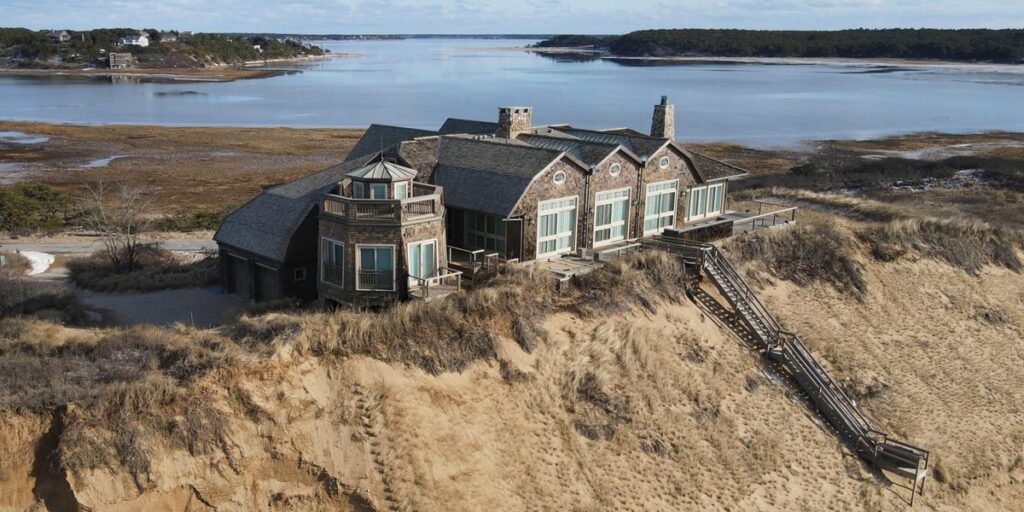- A mansion perched on a bluff in Cape Cod is at risk of falling into the sea due to erosion.
- Erosion is threatening luxury homes on coastlines across New England, including on nearby Nantucket.
- A Nantucket homebuyer said he regretted purchasing a cliffside property that he took a risk on.
Since its construction in 2010, a mansion with five bedrooms, an elevator, and a porch with sweeping waterfront views has sat on top of a bluff in Cape Cod.
How much longer it’ll be there is anyone’s guess.
The home in Wellfleet, Massachusetts, is at risk of sliding into Cape Cod Bay, the body of water between Cape Cod’s peninsula and the mainland. The bluff the property is perched on has receded 54 feet over the past decade, according to the Associated Press, which first reported on the house’s status.
It’s the latest in a string of luxury homes on Massachusetts coastlines falling victim to erosion fueled by the climate crisis.
When a home tumbles into the ocean, it can create dangerous levels of debris and threaten nearby wildlife. Wellfleet locals, in particular, are concerned about the threat to the local oyster industry, which employs many people in the small town.
Recently, some wealthy homebuyers have snapped up these on-the-edge luxury mansions at a discount, hoping to squeeze out a few more years of use before they meet a watery end.
Attorney John G. Bonomi, Jr. purchased the Wellfleet home for $5.5 million in 2022, when coastal erosion was already a threat. The original owners of the home tried for years to get the town to install protective measures to stall the erosion, but lost their appeals, according to the Provincetown Independent, a Cape Cod news outlet.
The home’s future took center stage at a January 15 meeting of the Wellfleet Conservation Commission.
“My client really wanted to save the house, but it’s just not possible at this point,” James Gallagher, a lawyer representing Bonomi, told the town officials present.
“So you plan to do nothing and allow it to fall into the water?” Lecia McKenna, a town official, responded.
A bedroom and part of the home’s deck were removed last year due to an emergency order by the town, the Independent reported. It’s unclear who will ultimately be responsible for dismantling the house: the owner or the town.
The commission voted to revisit the issue in June. Bonomi’s representatives did not return Business Insider’s request for comment.
Erosion has taken other mansions and threatens even more
Last year, billionaire Barry Sternlicht lost his Nantucket home, which he purchased for $610,000 in 2010, to erosion.
Another waterfront home nearby cratered in price, from an initial $2.3 million listing to being sold for $600,000, because of a quickly disappearing bluff.
Some wealthy vacationers are still taking chances.
On Nantucket, businessman Don Vaccaro paid $200,000 for a three-bedroom property in July of 2024, fully aware that its days were numbered. The home was initially listed for $2.2 million.
Six months after his purchase, the town of Nantucket ordered the house to be demolished before the ocean swallowed it whole.
Vaccaro told Business Insider he spent an extra $200,000 trying to save the house and regretted the whole ordeal.
“It was a terrible investment,” he wrote in an email in January. “I hoped to have the summer of 2025, but that will not happen.”
Experts predict erosion may only cause more headaches in the coming years.
Nantucket town manager C. Elizabeth Gibson warned that erosion was expected to worsen in the “foreseeable future” in a 2021 Coastal Resilience Plan for the island. Some coastlines on the island have already lost 100 feet in the last decade, the report said.
“The risks for Nantucket, a maritime community, are significant,” she wrote.
Bigger homes falling into the ocean is a pollution risk
The luxury finishes of the beachside mansions could pollute nearby waters if submerged.
In Wellfleet, where Bonomi’s mansion is close to the edge, town officials are concerned that materials could harm nearby oyster beds.
More than 15% of the small town’s about 3,600 permanent residents earn income through the oyster harvesting industry, according to the Wellfleet Oyster Alliance.
“The house has a lot of fiberglass insulation in it. It has toxic material in it,” John Cumbler, a member of the Wellfleet Conservation Commission, told the Associated Press. “It could endanger the oyster industry in Wellfleet, our major industry outside of tourism.”
Greg Mckechnie, a real-estate agent who has lived on Nantucket for 25 years, said the growing extravagance of the oceanside manors makes a potential cleanup even more disastrous.
“They’re not your classic beach house. They’re much more substantial,” Mckechnie told BI. “When I was a kid, if a house flooded down on Hulbert Avenue, you’d go get a broom, sweep the water out, and wait for it to dry.”
Read the full article here


